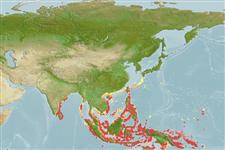Common names from other countries
Teleostei (teleosts) >
Acanthuriformes (Surgeonfishes) >
Pomacanthidae (Angelfishes)
Etymology: Chaetodontoplus: Greek, chaite = hair + Greek, odous = teeth + Greek, plous, ous, oo = crossing (Ref. 45335).
More on author: Bloch.
Environment: milieu / climate zone / depth range / distribution range
Ecology
Marine; reef-associated; non-migratory; depth range 1 - 20 m (Ref. 9710). Tropical; 36°N - 12°S, 78°E - 167°E
Indo-West Pacific: Japan to Indonesia, Sri Lanka and east to Papua New Guinea (Ref. 4859). Reported from Mentawai Islands (Ref. 27157). May consist of two separate species, one with an all-yellow tail and the other mostly gray tail (Ref. 48391).
Size / Weight / Age
Maturity: Lm ? range ? - ? cm
Max length : 18.0 cm TL male/unsexed; (Ref. 9710)
Inhabits continental shelf reefs; not usually found around oceanic islands (Ref. 9710). Feeds on sponges, tunicates, and filamentous algae (Ref. 9710). Forms small groups. Frequently exported through the aquarium trade (Ref. 48391). Very close to Chaetodontoplus poliourus Randall & Rocha, 2009 with different colors on pelvic, dorsal and caudal fins. The two species coexist in several islands of Indonesia (Ref. 82330) including Lesser Sunda Islands, Molucca Islands, Halmahera, and Bird's Head Peninsula of West Papua (Ref. 90102).
Life cycle and mating behavior
Maturities | Reproduction | Spawnings | Egg(s) | Fecundities | Larvae
Protogyny has been proposed for this species awaiting confirmation (Ref. 103751).
Myers, R.F., 1991. Micronesian reef fishes. Second Ed. Coral Graphics, Barrigada, Guam. 298 p. (Ref. 1602)
IUCN Red List Status (Ref. 130435)
CITES (Ref. 128078)
Not Evaluated
Threat to humans
Harmless
Human uses
Fisheries: minor commercial; aquarium: commercial
Tools
Special reports
Download XML
Internet sources
Estimates based on models
Preferred temperature (Ref.
115969): 25.5 - 29, mean 28.7 (based on 1472 cells).
Phylogenetic diversity index (Ref.
82804): PD
50 = 0.5000 [Uniqueness, from 0.5 = low to 2.0 = high].
Bayesian length-weight: a=0.03090 (0.01359 - 0.07026), b=2.89 (2.70 - 3.08), in cm Total Length, based on LWR estimates for this (Sub)family-body shape (Ref.
93245).
Trophic level (Ref.
69278): 2.7 ±0.00 se; based on food items.
Resilience (Ref.
120179): Medium, minimum population doubling time 1.4 - 4.4 years (Preliminary K or Fecundity.).
Fishing Vulnerability (Ref.
59153): Low vulnerability (10 of 100).
